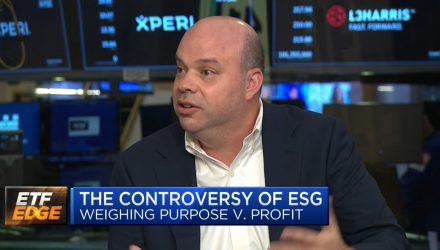VettaFi head of research Todd Rosenbluth appeared on Bob Pisani’s ETF Edge along with Vivek Ramaswamy, executive chairman of Strive Asset Management, and Arne Noack, head of systemic investment solutions for the Americas at DWS.
ESG remains a hot-button issue for many, with many arguing that firms should pay more attention to ESG issues. Ramaswamy’s firm Strive has been branding itself as a pushback against “woke capitalism” and using its ETF, the Strive U.S. Energy ETF (DRLL) to proxy vote against proposals that favor diversity, environmental stewardship, and egalitarianism.
“Our perspective is that U.S. energy companies should be focused on drilling or fracking or whatever allows them to be successful in the long run,” Ramaswamy said, claiming that ESG metrics introduce politics to the boardroom that would be better left, “to the politicians.”
ESG ETFs A Comparably Small Piece of the ETF Pie
Pisani noted that by number of ETFs that classify themselves as ESG funds are actually quite low, less than 1.5% of the total AUM among ETFs.
“ESG is a very small slice of the ETF marketplace,” Rosenbluth agreed, continuing, “ESG is a way of getting exposure to certain trends but it is a wide range of products we’re talking about.”
Ramaswamy attempted to argue that ESG isn’t just about ESG funds, but also the “green smuggling” of political issues into non-ESG funds. “That’s where the betrayal of trust occurs,” he said, railing against funds that, like his own fund, use their proxy votes to push political agendas. Ramaswamy also criticized what he referred to as the “verbal jujitsu” of some ESG proponents arguing in favor of ESG investing through the case that companies should have to do good and help society in exchange for some of the benefits and freedom allotted to them, even though it impacts bottom line profits. Other ESG proponents argue that ESG investing has long-term financial upside given that more diverse companies with future-focused policies tend to outperform.
Rosenbluth pointed out that, “there are no ESG-only firms. The fact that we have an anti-ESG firm is ironic because we don’t have any ESG firms.” He noted that firms that carry ESG products also carry non-ESG products and simply aim to have a wide suite of available funds for investors to choose from.
Ramaswamy said it isn’t about whether these firms are using ESG metrics, it’s that they advocate for ESG policies in their firmwide commitments.
“What people are doing is putting money to work in broadly diversified ETFs,” Rosenbluth countered.
A Closer Look at Exclusions
Looking under the hood of some of the holdings in the Xtrackers S&P 500 ESG ETF (SNPE) Pisani said, “SNPE looks like a big cap growth fund.
“All of those positions aren’t mutually exclusive or controversial as such,” Noack responded, saying that there is room for improvement because you don’t start at perfection but strive for it. “That fund is designed to be an ESG version of the standard S&P 500,” he continued, noting that SNPE screens out 25% of the worst companies in each sector, from an ESG perspective.
Ramaswamy proffered criticism of BlackRock voting for a racial equity proposal at Apple’s board and Chevron’s commitments to reduce its footprint. “I have no issues with funds using exclusions,” Ramaswamy said. “I have a problem with using the money someone else invested in funds with the expectations that someone voting in those funds is only going to take the fiduciary interests into account,” he continued, trying to make a case that investors don’t want their capital being spent that way. “I aim to bring added choice to the marketplace.”
Rosenbluth got in the final word about investor decisions, “I would note that the iShares US Energy ETF (IYE) saw significant inflows with the past month, so again investors have choices, but IYE is outgaining DRLL.”
For more news, information, and strategy, visit VettaFi.
